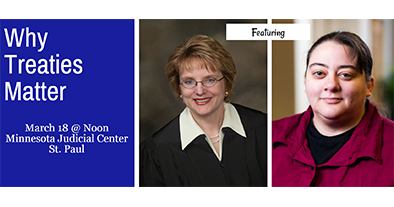News Item
Public invited to explore ‘Why Treaties Matter’ at March 18 event
Posted: Tuesday, March 1, 2016

State Law Library to host traveling exhibit March 15-31
Dowload Program Flyer
On Friday, March 18, the Minnesota Judicial Branch and the Minnesota Tribal Court State Court Forum will host a midday event highlighting how Dakota and Ojibwe treaties with the U.S. government impacted the lands and history of Minnesota and its people. The event will be held at the Minnesota Judicial Center in St. Paul.
The event, which is free and open to the public, will feature opening remarks from Minnesota Supreme Court Chief Justice Lorie S. Gildea. In addition, Professor Colette Routel, Co-Director of the Indian Law Program at Mitchell Hamline School of Law, will deliver a short presentation titled, “Finding the Indian Understanding of Treaties.”
Event attendees will also have an opportunity to tour
Why Treaties Matter: Self-Government in the Dakota and Ojibwe Nation, a nationally recognized, award-winning, traveling exhibit. The exhibit is available for free self-guided tours at the Minnesota State Law Library from March 15 through March 31.
More information on the event and exhibit is available below:
Why Treaties Matter: Program and Reception
What:
A public event highlighting the importance and impact of Dakota and Ojibwe treaties with the U.S. government, featuring remarks from Minnesota Supreme Court Chief Justice Lorie S. Gildea and Professor Colette Routel, Co-Director of the Indian Law Program at Mitchell Hamline School of Law.
A synopsis of Professor Routel’s presentation, “Finding the Indian Understanding of Treaties,” is below:
Unlike statutes and treaties with foreign nations, treaties with Indian tribes are not usually interpreted in accordance with their plain meaning. Instead, they are interpreted as the tribal negotiators would have understood them. “Finding the Indian Understanding of Treaties” will address the importance of that canon of construction in modern litigation to protect tribal treaty rights by examining the specific history of treaty negotiations between the United States and Ojibwe tribes in the Great Lakes region.
When:
Friday, March 18, Noon to 1 p.m.
Where:
Minnesota Judicial Center, Room 230
25 Rev. Dr. Martin Luther King Jr. Blvd.
St. Paul, MN 55155
Why Treaties Matter: Traveling Exhibit
What:
Why Treaties Matter: Self-Government in the Dakota and Ojibwe Nation is a nationally recognized, award-winning, traveling exhibit developed by the Minnesota Indian Affairs Council, the Minnesota Humanities Center, and the Smithsonian Institution’s National Museum of the American Indian. More information on the exhibit is available at
www.treatiesmatter.org.
When:
The exhibit will be on display at the Minnesota State Law Library from March 15 through March 31. The exhibit is available for free, self-guided tours during normal library hours (8:30 a.m. to 5 p.m., Monday-Friday). More information is available at
http://mn.gov/law-library/.
Where:
Minnesota State Law Library
Minnesota Judicial Center, Ground Floor
25 Rev. Dr. Martin Luther King Jr. Blvd.
St. Paul, MN 55155
About the Tribal Court State Court Forum
The Tribal Court State Court Forum (TCSCF) is comprised of tribal court judges from Minnesota’s 11 federally recognized tribes and state court judges from Minnesota’s 87 district courts.
The purpose of the TCSCF is to enhance tribal court and state court relationships, provide an opportunity to address issues arising from the courts’ concurrent jurisdictions, collaborate on development and delivery of judicial education and training, recommend revisions to Minnesota’s procedural rules of court, and work on issues that cross jurisdictional boundaries.